CDBG and HOME Programs
|
 |
Community Development Block Grant Program (CDBG)
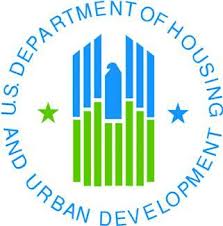 The primary objective of the CDBG Program is to increase the supply of decent, safe, sanitary and affordable housing within the City’s communities and to support the programs that are designed to assist low- and moderate-income families and individuals while stimulating and fostering economic growth.
The primary objective of the CDBG Program is to increase the supply of decent, safe, sanitary and affordable housing within the City’s communities and to support the programs that are designed to assist low- and moderate-income families and individuals while stimulating and fostering economic growth.
CDBG funds are used for a wide range of activities, including housing rehabilitation, removal of dilapidated structures, property acquisition, economic development, public improvements, and public services. The City will use this funding to carry out the following activities: owner-occupied housing rehabilitation, acquisition of additional properties and vacant lots to create additional affordable units, emergency repairs for qualified owner-occupied residents, and demolition and clearance of deteriorated structures. In addition, the City will set aside $50,000 - $70,000 for nonprofits that provide public services to the community. The City received a CDBG entitlement amount for FY 2025-2026 of $560,220.00.
Public Service Agency Assistance
Each year the City sets aside between 10% and 12% of its annual CDBG allocation for eligible nonprofits that provide supportive or human services assistance. Among the organizations that receive assistance are Cabarrus Meals on Wheels, Cooperative Christian Ministry, and Prosperity Unlimited, Inc.
Click here to view the City’s CDBG Policies and Procedures Manual.
Home Investment Partnerships Program (HOME)
Cabarrus/Iredell/Rowan HOME Consortium
The Cabarrus/Iredell/Rowan HOME Consortium was formed in 2005 for the purpose of cooperatively providing safe, decent and affordable housing to low- and moderate- income citizens living within eight (8) adjacent local governments, which includes the City of Concord, Cabarrus County, Iredell County, the City of Kannapolis, the Town of Mooresville, the City of Salisbury, the City of Statesville, and Rowan County. There also are three (3) community housing development organizations (CHDOs) that are part of the Consortium. The City of Concord is the Lead Entity of the Cabarrus/Iredell/Rowan HOME Consortium and is authorized to request, submit, and receive HOME funds for the Consortium directly from the U.S. Department of Housing and Urban Development (HUD). The City distributes funds to Consortium Members, manages the program, and ensures regulatory compliance.
Eligible activities include the construction of affordable single-family and rental housing, property acquisition, the purchase/rehab/resale of affordable housing and down payment assistance for low- and moderate-income, first-time homebuyers. The Consortium Members and the CHDOs will carry out the following activities during the FY 2024-2025 funding cycle: new construction of affordable homes for purchase, downpayment assistance for qualified first-time homebuyers, housing rehabilitation assistance for qualified, owner-occupied residents, and acquisition of existing housing stock to rehabilitate and resale as affordable units. The City received a HOME entitlement Consortium amount of $1,238,487.98 for FY 2025-2026, of which $269,116.73 is allocated to the City of Concord.
Click here to view the City’s HOME Policies and Procedures Manual.
Click here to view the Cabarrus/Iredell/Rowan HOME Consortium’s Policies and Procedures Manual.
Click here to view the Cabarrus/Iredell/Rowan HOME Consortium’s HOME American Rescue Plan (ARP) Policy Manual.
Concord's CDBG and HOME Funding Priorities
|
 |
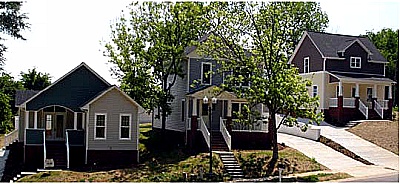 Through the CDBG & HOME Programs, the City provides housing assistance to income-eligible residents for the purchase, rehabilitation, and/or construction of homes through several different programs. There are four programs available: Downpayment Assistance, Housing Rehabilitation Assistance Programs, and Emergency Rehabilitation.
Through the CDBG & HOME Programs, the City provides housing assistance to income-eligible residents for the purchase, rehabilitation, and/or construction of homes through several different programs. There are four programs available: Downpayment Assistance, Housing Rehabilitation Assistance Programs, and Emergency Rehabilitation.
The affordable housing programs are primarily funded through the Community Development Block Grant (CDBG) and HOME Investment Partnerships (HOME) Programs. The City is awarded funds from each of these programs on an annual basis. Both operate under the 2020-2024 Consolidated Plan, which establishes a unified, coordinated vision for community development actions for five years. The City uses input from citizens and its community development partners to determine its housing and community development needs, to develop strategies for addressing those needs, and to undertake specific actions consistent with those strategies.
To be eligible for one of the housing assistance programs, a family’s household income may not exceed 80% of the area’s median income. The maximum allowable household income is determined by household size and income as indicated in the chart below:
|
HUD Fiscal Year 2025 Annual Income Limits
|
|
1 person household
|
$62,850
|
|
2 person household
|
$71,800
|
|
3 person household
|
$80,800
|
|
4 person household
|
$89,750
|
|
5 person household
|
$96,950
|
|
6 person household
|
$104,150
|
|
7 person household
|
$111,300
|
|
8 person household
|
$118,500
|
Downpayment Assistance Program
This program provides down payment and closing cost assistance up to $10,000 to eligible first-time home buyers. Eligible home buyers are individuals or families that meet the income limits set by HUD and are first-time home buyers or have not owned a home within three years of the anticipated purchase date. The cost of the home cannot exceed $332,000 (existing home) or $350,000 (new construction), and must be located within the city limits of Concord. The applicant will be required to attend home buyer education classes prior to the purchase, and provide $1,000 of their own funds towards the purchase. Funds are limited and provided on a first-come first-serve basis.
Assistance is provided through a second mortgage in the form of a five-year forgivable loan. The City of Concord provides downpayment assistance for single-family homes. Condos and mobile homes are not eligible for assistance through this Program. All lenders must be approved by the City of Concord in order to participate in this program.
Additional tips for completing the application process:
-
Eligible home buyers are individuals or families that meet the income limits set by HUD and are first-time home buyers or have not owned a home within three (3) years of the anticipated purchase date.
-
Downpayment Assistance Applications along with executed purchase contracts (both parties signatures) must be received with at least 45 days before the date of closing.
-
Applicants for this program must meet the income requirements and be pre-approved by a bank or financial institution for an adequate amount to purchase the home stated in their application.
-
Lenders must be approved by the City of Concord in order to participate. See the section below under No. 5. entitled "View the City of Concord's Approved Lenders List" for the requirements to become an approved lender with the City of Concord.
-
In addition, applicants are required to contribute a minimum of $1,000.00 of their own funds towards the purchase price.
-
Applicant(s) must complete an eight-hour homebuyer education workshop that is provided by a HUD-approved agency or counselor, and submit the certificate of completion prior to becoming eligible for this program. HUD-certified online courses are permissible; however, you must complete a minimum of four (4) in-person hours with a HUD-approved housing counselor for a financial analysis (certificate required).
-
The City of Concord provides down payment assistance for single-family homes and manufactured homes. Condos and mobile homes are not eligible for assistance through this Program.
To begin this process, complete the following recommended steps:
-
View the short video from the U.S. Department of Housing & Urban Development (HUD) that outlines the basic steps to homeownership.
-
View the HUD website for more information about buying a home.
-
Schedule a Homebuyer Education Class with a Certified Housing Counseling Agency. Click here for the HUD Certified Counseling Agency List to assist with the required 8-hour workshop and the 4-hour one-on-one counseling session. These classes provide guidance to purchase a home, complete a financial analysis, and avoid undesirable contracts and loan products.
-
View the N.C. Housing Finance Agency’s (NCHFA’s) Home-Buyer Programs website for information about additional downpayment assistance opportunities and view NCHFA’s current Lender List here.
-
View the City of Concord’s Approved Lenders list below. Simply click on the lender’s name to begin the prequalification process. If your lender is not included in this list, send the Lender Approval Documents to your loan officer to begin the process. Click here to download the Lender Approval Documents in English, and click here to download the Lender Approval Documents in Spanish.
Program Contact Information: 704-920-5154 or Contact Us by clicking here.
For convenience, apply online by clicking here.
Click here to print and mail an application in English for consideration, and click here to print and mail an application in Spanish for consideration.
Click here to view our Downpayment Assistance Program brochure in English, and click here to view our Downpayment Assistance Program brochure in Spanish.
The City of Concord’s FY 24-25 Approved Lenders:
Housing Rehabilitation Assistance Programs
Assistance through these programs are available to low and moderate income homeowners whose homes are in substandard condition. The applicant must own and reside in the home and meet HUD income limits. Single-family homes and manufactured homes are eligible for assistance, but the City also may approve mobile homes for assistance. Condos are not eligible for assistance through these Programs.
Substantial Rehabilitation Program
Maximum assistance is based on HUD’s Maximum Post-Rehabilitation Property Value of $332,000. If the tax value of the home, plus the cost of repairs exceed these limits, assistance cannot be provided. In addition, if the cost of repairs plus all mortgage(s), lien(s) or judgement(s) balances exceeds the tax value, assistance cannot be provided. The assistance is through a low interest or forgivable loan that is based on the annual household income.
The Substantial Rehabilitation Program addresses major housing code and structural problems. Funding for this program is provided by the HOME Investment Partnership Program.
Emergency Rehabilitation Program
The Emergency Rehabilitation Program provides repairs that are urgent in nature and necessary to protect the health and safety of the occupants.
Examples include, but are not limited to, the repair or replacement of HVAC, roofing, plumbing or electrical systems. This program is not intended to address every code issue in a house. Maximum assistance through this program is $15,000.
To apply for assistance, please fill out the application for Housing Rehabilitation Assistance. (Note: After opening the application, you may type your information into the form by clicking on the Typewriter Tool in Acrobat Reader).
Funding for this program is provided by the Community Development Block Grant (CDBG) Program.
Program Contact Information: 704-920-5154 or Contact Us by clicking here.
For convenience, apply online by clicking here.
To print and mail an application, click here for English, or click here for Spanish.
To view our brochure, click here for English, or click here for Spanish.
Resources for General Contractors
The City of Concord receives funding directly from the U.S. Department of Housing and Urban Development (HUD) to perform emergency repairs and to rehabilitate homes that are owned by low- and moderate-income families and are located within the City limits. The City’s funding also is used to construct new, affordable homes that are added to its current housing stock. All work is carried out by private contractors under the supervision of staff through a competitive bid process.
The City of Concord actively seeks licensed general contractors to participate in its housing programs. Qualified contractors will be added to the City’s contractor list for bid solicitation. A North Carolina General Contractors License is required for all contracts. All contractors must have a Renovation, Repair and Painting certificate to participate in the City’s Housing Rehabilitation Programs. All contractors must comply with the City’s bonding and general liability insurance requirements. Small disadvantaged and minority firms are encouraged to participate.
Click here to access the Memorandum of Understanding, the Contractor Application, the Vendor Information, and the W-9 Form.
To register for the City's online bidding process, please click here.
For more information about participating in our public procurement process and to receive bid requests, contact us by using our Contact Form or 704-920-5152.
Fair Housing
|
 |
 The Fair Housing Act of 1968 is also known as Title VIII of the Civil Rights Act of 1968. The Act explicitly defines a list of prohibited practices involving housing, including sales, rentals, advertising, and financing. Its primary prohibitions makes it unlawful to refuse to sell, rent to , or negotiate with any person because of that person's race, color, religion, sex, familial status, handicap, or national origin. The Fair Housing Amendments Act of 1988 added extensive provisions to apply to discrimination against disabled persons and families with children 18 years of age or under. Municipalities, local government units, cities and federal agencies are subject to the law.
The Fair Housing Act of 1968 is also known as Title VIII of the Civil Rights Act of 1968. The Act explicitly defines a list of prohibited practices involving housing, including sales, rentals, advertising, and financing. Its primary prohibitions makes it unlawful to refuse to sell, rent to , or negotiate with any person because of that person's race, color, religion, sex, familial status, handicap, or national origin. The Fair Housing Amendments Act of 1988 added extensive provisions to apply to discrimination against disabled persons and families with children 18 years of age or under. Municipalities, local government units, cities and federal agencies are subject to the law.
Basic Facts About Fair Housing
What Housing is Covered?
The Fair Housing Act covers most housing. In some circumstances, the Act exempts owner-occupied buildings with no more than four units, single-family housing sold or rented without the use of a broker, and housing operated by organizations and private clubs that limit occupancy to members.
What Is Prohibited?
In the Sale and Rental of Housing: No one may take any of the following actions based on race, color, national origin, religion, sex, familial status or handicap (disability):
-
Refuse to rent or sell housing
-
Refuse to negotiate for housing
-
Make housing unavailable
-
Deny a dwelling
-
Set different terms, conditions or privileges for sale or rental of a dwelling
-
Provide different housing services or facilities
-
Falsely deny that housing is available for inspection, sale, or rental
-
For profit, persuade owners to sell or rent (blockbusting) or
-
Deny anyone access to or membership in a facility or service (such as a multiple listing service) related to the sale or rental of housing.
In Mortgage Lending: No one may take any of the following actions based on race, color, national origin, religion, sex, familial status or handicap (disability):
-
Refuse to make a mortgage loan
-
Refuse to provide information regarding loans
-
Impose different terms or conditions on a loan, such as different interest rates, points, or fees
-
Discriminate in appraising property
-
Refuse to purchase a loan or
-
Set different terms or conditions for purchasing a loan.
In Addition: It is illegal for anyone to:
-
Threaten, coerce, intimidate or interfere with anyone exercising a fair housing right or assisting others who exercise that right.
-
Advertise or make any statement that indicates a limitation or preference based on race, color, national origin, religion, sex, familial status, or handicap. This prohibition against discriminatory advertising applies to single-family and owner-occupied housing that is otherwise exempt from the Fair Housing Act.
Additional Fair Housing Protection If You Have A Disability
If you or someone associated with you:
-
have a physical or mental disability (including hearing, mobility and visual impairments, chronic alcoholism, chronic mental illness, AIDS, AIDS Related Complex and mental retardation) that substantially limits one or more major life activities;
-
have a record of such a disability or are regarded as having such a disability;
then, your landlord may not:
-
refuse to let you make reasonable modifications to your dwelling or common use areas, at your expense, if necessary for the disabled person to use the housing. (Where reasonable, the landlord may permit changes only if you agree to restore the property to its original condition when you move.);
-
refuse to make reasonable accommodations in rules, policies, practices or services if necessary for the disabled person to use the housing.
Example: A building with a "no pets" policy must allow a visually impaired tenant to keep a guide dog.
Example: An apartment complex that offers tenants ample, unassigned parking must honor a request from a mobility-impaired tenant for a reserved space near his/her apartment if necessary to assure that he/she can have access to their apartment.
Note that housing need not be made available to a person who is a direct threat to the health or safety of others or who currently uses illegal drugs.
Requirements for New Buildings
In buildings constructed after March 1991 that have four or more units and an elevator:
Public and common areas must be accessible to persons with disabilities
Doors and hallways must be wide enough for wheelchairs
All units must have:
-
An accessible route into and through the unit
-
Accessible light switches, electrical outlets, thermostats and other environmental controls,
-
Reinforced bathroom walls to allow later installation of grab bars and,
-
Kitchens and bathrooms accessible to people in wheelchairs.
If a building constructed after March 1991 with four or more units has no elevator, these standards apply to ground floor units.
These requirements for new buildings do not replace any more stringent standards in State or local law.
Housing Opportunities for Families
Unless a building or community qualifies as housing for older persons, it may not discriminate based on familial status. That is, it may not discriminate against families in which one or more children under 18 live with:
-
A parent,
-
A person who has legal custody of the child or children or,
-
The designee of the parent or legal custodian, with the parent or custodian's written permission.
Familial status protection also applies to pregnant women and anyone securing legal custody of a child under 18.
Exemption: Housing for older persons is exempt from the prohibition against familial status discrimination if:
-
The HUD Secretary has determined that it is specifically designed for and occupied by elderly persons under a Federal, State or local government program or,
-
It is occupied solely by persons who are 62 or older or,
-
It houses at least one person who is 55 or older in at least 80 percent of the occupied units, and adheres to a policy that demonstrates an intent to house persons who are 55 or older.
Source: HUD Fair Housing
Plans and Reports
|
 |
The Five-year Consolidated Plan
The City of Concord receives federal grants annually under two programs: The Community Development Block Grant Program (CDBG) and the HOME Investment Partnerships Program (HOME). Together, these programs invest approximately $1,200,000 a year into the areas’ low- and moderate-income communities in Concord and the counties of Cabarrus, Iredell and Rowan, to provide affordable housing, economic opportunities, and a suitable living environment.
Every five years, the City of Concord prepares a “Consolidated Strategic Housing and Community Development Plan”. The purpose of the plan is to examine the needs and priorities for housing and community development activities for the next five years and establish the strategies to be pursued and performance targets to be achieved through federal CDBG and HOME funded activities.
FY 2020-2024 Consolidated Plan
Annual Action Plan for CDBG & HOME Programs
Each May, the City prepares and submits a new Annual Action Plan to HUD. This plan describes in detail how CDBG and HOME funds will be used over the next 12 months. Public hearings are held to provide information on achievements and to receive public input on how the upcoming year’s funds should be allocated.
Fiscal Year 2019-2020 Annual Action Plan
Fiscal Year 2020-2021 Annual Action Plan
Fiscal Year 2021-2022 Annual Action Plan
Fiscal Year 2022-2023 Annual Action Plan
Fiscal Year 2023-2024 Annual Action Plan
Consolidated Annual Performance and Evaluation Report (CAPER)
Each year the City of Concord prepares a Consolidated Annual Performance and Evaluation Report (CAPER) for the CDBG & HOME Programs. This report provides a wealth of detailed information on all the programs supported with these funds during the year not just for Concord, but also for the three-county HOME Consortium area.
Housing Needs Assessment
The Housing Needs Assessment Report was provided for the Cabarrus/Iredell/Rowan HOME Consortium to understand the current market conditions and projected changes that are anticipated to occur that will influence future housing needs within the Tri-County Region. The Report includes demographic characteristics and trends, economic conditions and initiatives, existing housing supply and development pipeline data, other various factors and community input for the seven individual submarkets within the region, which include three individual counties and four specified municipalities. The Report identifies the projected housing gaps and the strategies that can be developed and implemented to address the housing needs within this Region and the Report can be accessed by clicking on the report cover below.
|
|
|
For questions, contact Pepper Bego at 704-920-5152 or Contact Us
|
Analysis of Impediments to Fair Housing Choice
The Analysis of Impediments to Fair Housing Choice Report was prepared to satisfy the requirements of the Housing and Community Development Act of 1974. The Report must be completed every five (5) years by Grantees that receive federal funding from the U.S. Department of Housing and Urban Development (HUD). The Report requires communities to analyze a series of fair housing issues and identify any impediments to fair housing choice. This report includes an analysis of various demographic, economic and housing indicators that were identified by citizens that reside within the eight (8) jurisdictions that make up the tri-county area of the Cabarrus/Iredell/Rowan HOME Consortium. This Report outlines the impediments to fair housing choice and recommends steps to address and overcome the impacts of the identified impediments and the Report can be accessed by clicking on the report cover below.
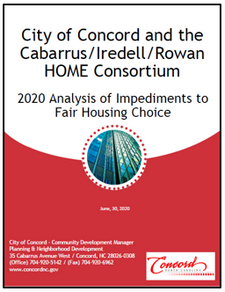 |
|
For questions, contact Pepper Bego at 704-920-5152 or Contact Us
|
Cabarrus/Iredell/Rowan HOME Consortium Policies & Procedures Manual
The Cabarrus/Iredell/Rowan HOME Consortium represents a unique HOME collaboration between three (3) counties in North Carolina: Cabarrus County, Iredell County, and Rowan County. The City of Concord is the Lead Entity for the HOME Consortium, which also includes the City of Kannapolis, the City of Salisbury, Cabarrus County, Iredell County, the City of Statesville, Rowan County, and the Town of Mooresville. The Consortium enjoys the size and strength that a regional approach provides while remaining flexible enough to meet local needs.
The Cabarrus/Iredell/Rowan HOME Consortium Policies & Procedures Manual was developed to provide an overview of the Cabarrus/Iredell/Rowan HOME Consortium policies and procedures that pertain to the federal HOME Investment Partnerships Program (HOME). This Manual is not a substitute for HOME Program regulations, but this information is provided in addition to the federal regulations. Although this Manual was developed with reasonable care and diligence, it is not fully comprehensive concerning all of the requirements that affect the used of HOME Program funds. HOME Consortium Members are encouraged to consult with the City of Concord’s staff, as the Lead Entity, to verify the correct interpretation of policies and regulations. The Cabarrus/Iredell/Rowan HOME Consortium also reserves the right to implement additional policies as needed.
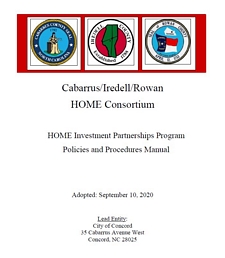 |
|
For questions, contact Pepper Bego at 704-920-5152 or Contact Us
|
Affordable Housing Market Study
In 2019, the City of Concord hired a firm to conduct an Affordable Housing Market Study (AHMS) to analyze the critical housing needs for the next 10 years. This AHMS provides a long-range strategy for addressing the trends that are impacting the housing market and identifying the shortcomings and barriers to securing quality housing that is affordable to its citizens based on the current and projected populations. The AHMS highlights expected future demands for housing and it provides an inventory of the assets and programs that are available to help the City to address these challenges. The AHMS also provides recommendations for meeting the housing needs despite the existing conditions, obstacles and opportunities that are prevalent within the City’s affordable housing market. Please take a moment to review this all-important Study that will affect the City’s housing decisions the for many years to come by clicking on the report cover below.
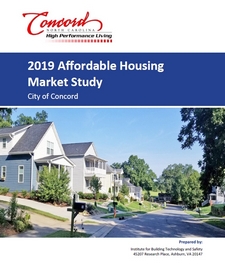 |
|
For questions, contact Pepper Bego at 704-920-5152 or Contact Us
|